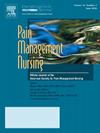心脏手术后疼痛管理的患者体验:混合方法研究
IF 2.1
4区 医学
Q2 NURSING
引用次数: 0
摘要
目的:经胸骨切开的心脏手术后的恢复包括从侵入性机械通气中断气、维持血液动力学稳定和预防并发症。在术后早期,首要任务是充分控制疼痛,使患者能够积极参与锻炼。本研究的目的是:(i) 描述经胸骨切开心脏手术后的镇痛处方和给药方法;(ii) 探讨患者的疼痛体验以及这对参与术后早期护理的影响:本研究项目是一项试验性描述性探索研究,采用多种方法,在单一地点进行。研究人员对病历进行了审核,以了解术后头 3 天内处方和使用多模式镇痛药的详细情况以及疼痛强度评分。在心脏手术后第 3-4 天,对 20 名术后患者进行了半结构式访谈,并获得了他们对有效问卷的答复,以确定患者的疼痛体验以及疼痛对参与康复的影响:结果:患者在康复期间对疼痛强度的体验各不相同。共有 19 名患者(95%)100% 服用了每日固定剂量的镇痛药,但只有 22% 的患者在第 1 天按需服用了阿片类药物,只有 12% 的患者在第 2 天服用了阿片类药物。许多患者在接受访谈前的 24 小时内,在休息和活动时的疼痛程度均高于病历记录的疼痛程度:患者在接受心脏大手术后可能会感到剧烈疼痛,而这种疼痛会妨碍他们参与深呼吸、咳嗽和活动等重要活动,而这些活动对他们的康复至关重要。我们发现了术后早期突破性疼痛管理方面的不足。为了促进心脏手术后的最佳恢复,护士需要评估休息和活动时的疼痛,并根据需要给予有效剂量的镇痛剂,以控制突破性疼痛的发生。此外,患者需要了解更多信息,以理解疼痛得到良好控制与他们参与康复的能力之间的联系:为促进心脏手术后的最佳恢复,护士需要评估患者在休息和运动时的疼痛,并根据需要给予有效剂量的镇痛剂,以控制突破性疼痛的发生。此外,患者需要获得更多信息,以了解疼痛得到良好控制与他们参与康复的能力之间的联系。本文章由计算机程序翻译,如有差异,请以英文原文为准。
Patient Experience of Pain Management Following Cardiac Surgery: A Mixed Methods Study
Purpose
Recovery following cardiac surgery via sternotomy involves weaning from invasive mechanical ventilation, maintaining hemodynamic stability, and preventing complications. In the early postoperative period, a key priority is adequate pain control to allow patients to actively participate in exercise. The purpose of this study was to (i) describe analgesic prescribing and administration practices following cardiac surgery via sternotomy and (ii) explore patients’ pain experience and how this impacted participation in early postoperative care.
Methods
This research project was a pilot descriptive exploratory study using multiple methods and conducted within a single site. A medical record chart audit was performed to obtain details of prescribed and administered multimodal analgesics and pain intensity scores over the first 3 days following surgery. Semi-structured interviews and responses to validated questionnaires were obtained from 20 postoperative patients on days 3-4 following cardiac surgery to determine pain experience and the impact of pain on participation in recovery.
Results
Patients had a varied experience of pain intensity during their recovery. A total of 19 patients (95%) received 100% of their fixed daily dose of analgesics, but only 22% of available as needed opioids were administered on day 1 and only 12% were administered on day 2. Many patients experienced higher levels of pain at both rest and movement in the 24 hours prior to interview than were recorded in their medical records.
Conclusions
Patients can experience significant pain following major cardiac surgery, and this pain can hinder their ability to participate in important activities, such as deep breathing and coughing and mobilizing, that are central to their recovery. Gaps in the management of breakthrough pain in the early postoperative period were identified. To promote optimal recovery following cardiac surgery, nurses need to assess pain at both rest and movement and administer effective doses of as needed analgesia to manage the occurrence of breakthrough pain. Additionally, patients need to be more informed to understand the link between well controlled pain and their ability to participate in their recovery.
Clinical Implications
To promote optimal recovery following cardiac surgery, nurses need to assess pain at both rest and movement and administer effective doses of as needed analgesia to manage the occurrence of breakthrough pain. Additionally, patients need to be more informed to understand the link between well controlled pain and their ability to participate in their recovery.
求助全文
通过发布文献求助,成功后即可免费获取论文全文。
去求助
来源期刊

Pain Management Nursing
医学-护理
CiteScore
3.00
自引率
5.90%
发文量
187
审稿时长
>12 weeks
期刊介绍:
This peer-reviewed journal offers a unique focus on the realm of pain management as it applies to nursing. Original and review articles from experts in the field offer key insights in the areas of clinical practice, advocacy, education, administration, and research. Additional features include practice guidelines and pharmacology updates.
 求助内容:
求助内容: 应助结果提醒方式:
应助结果提醒方式:


